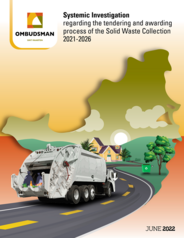Ombudsman Gwendolien Mossel recently concluded the Systemic Investigation into the tendering and awarding process of the Solid Waste Collection 2021-2026. After providing a Preliminary Findings Report (PFR) on 11 April 2022, the Final Report (FR) was submitted on 27 June 2022 to the Minister of Public Housing, Spatial Planning, Environment, and Infrastructure (VROMI).
Shortly after the awarding process of the Solid Waste Collection 2021-2026, complaints were filed with the Ombudsman against the Minister of VROMI by multiple bidders that participated in the collection of solid waste tender, who expressed concerns regarding the credibility, reliability, and transparency of the process. Considering the complaints/concerns received, and the importance of transparency of procurement procedures and policies of government, the Ombudsman decided to conduct a Systemic Investigation in the general interest of the public.
The main question that the Ombudsman sought to answer with this investigation is: Was the tendering and awarding process of the solid waste collection 2021-2026, as well as the pertinent procedures and policies followed by the evaluation committee, fair and transparent? The preparations for the tender process for the solid waste collection did not start in a timely manner. This perhaps contributed to the deficient quality of the terms of reference. In this regard, the adage ‘haste makes waste’ rings true.
The department of Infrastructure Management acknowledged that they were under enormous pressure to complete the tender on time. That resulted in the approval of an insufficiently vetted terms of reference and quickly putting an evaluation committee together. The committee was instantly met with challenges in terms of the interpretation and execution of certain critical provisions in the terms of reference, which led to arbitrary decision-making, infighting and ultimately resignations, whereby four of the seven committee members distanced themselves from the results of the tender. The Ombudsman concludes based on the findings that the tendering and awarding process was neither fair nor sufficiently transparent.
The application of certain provisions in the terms of reference, particularly the requirement of the original business license based on the scope of the work tendered, and the pricing component disproportionally affected some contractors, while at the same time advantaged others. The end result is that the bidding process was mismanaged whereby some contractors were, more than six months after the start of the contracts, unable to live up to the requirements in the ToR/contract, resulting in poor execution of the works.
The minister refused to provide critical information (signed individual evaluation sheets for the completeness of tender documents and signed internal findings reports). The Ombudsman was therefore unable to make a complete assessment and determination regarding the transparency of the tendering and awarding process, as such the Ombudsman concludes that the process was not sufficiently transparent.
As contractors could not compare the final results of their respective bids with their competitors, due to the ministries' refusal to provide an evaluation report when queried, the Ombudsman therefore concludes that, based on fundamental procurement principles, the procedures and policies followed by the evaluation committee were also not sufficiently transparent.
Based on the investigation, the Ombudsman has identified bottlenecks and challenges in the preparation of the Terms of Reference, evaluation, and selection as well as the post awarding phase of the procurement process.
Please find the full press release and the Special Report in the download section below.
Source: Office of the Ombudsman, Sint Maarten

